Atomic Echoes: The Johnny Cash Requiem
In the year 2045, the world had become a desolate wasteland, a testament to the nuclear age’s relentless march. The sun, once a source of warmth and light, had dimmed to a sickly orange glow, casting long shadows across the desolate landscape. The remnants of humanity clung to life in scattered communities, each vying for survival in a world where the specter of nuclear annihilation had become a constant presence.
In the middle of this wasteland, a solitary figure roamed the desolate roads. He was Johnny Cash, a man whose voice had once echoed through the halls of fame and now resonated with the echoes of a dying world. His guitar, a relic from a time when music was a shared experience, was his only companion.
Johnny had been a soldier in the military, a man who had seen the worst of humanity and the worst of the world. He had fought in the nuclear war, and he had lost everything—his family, his home, his world. But despite the scars he bore, he still carried the gift of song within him, a gift he had vowed to share with the world, even if the world itself was on the brink of extinction.
One day, while wandering through the ruins of a once-thriving city, Johnny stumbled upon an old, weathered poster. It featured a cowboy, his silhouette outlined against a backdrop of mushroom clouds, his guitar held close as if ready to face the end of the world. The image was eerie, yet it struck a chord within Johnny. The cowboy’s name was the Atomic Cowboy, and he was a legend in the world of post-apocalyptic music.
Intrigued, Johnny sought out the Atomic Cowboy’s music, a collection of haunting ballads that spoke of nuclear fear, survival, and the human spirit’s indomitable will to live. As he listened to the music, Johnny felt a connection to the Atomic Cowboy, a kinship born of shared experiences and a shared destiny.
One evening, as the sun dipped below the horizon, casting the world in shades of gray and purple, Johnny found himself in the ruins of an old concert hall. The stage was empty, but he imagined the Atomic Cowboy standing there, singing into the silence, his voice a beacon of hope in a world that had all but given up.

Johnny took the stage, his guitar in hand, and began to play. The music was raw and emotional, filled with the pain of loss and the hope of a future that might never come. The crowd, a small group of survivors gathered in the ruins, listened intently, their eyes reflecting the haunting melodies.
As Johnny sang, the Atomic Cowboy’s words seemed to come to life, resonating with the survivors' own experiences. The music became a collective experience, a bridge between the past and the present, a reminder that even in the darkest of times, the human spirit could not be extinguished.
The song reached its climax, the lyrics a cri de cœur to the heavens above, a plea for redemption and peace. In that moment, the crowd erupted into applause, their voices a chorus of hope and defiance. Johnny felt a sense of purpose he had not known for years, a sense that he was doing something meaningful, that he was a part of something larger than himself.
Days turned into weeks, and Johnny’s performances grew in popularity. He became a symbol of hope, a reminder that humanity had not completely lost its way. The Atomic Cowboy’s Nuclear Age Ballad had become a touchstone for the survivors, a reminder of the resilience of the human spirit.
One night, as Johnny played in an abandoned stadium, he looked out at the crowd, a sea of faces reflecting the light of the stars above. He realized that he had found his purpose, that he was not just a survivor, but a guardian of the Atomic Cowboy’s legacy. With each note he played, he was weaving a tapestry of hope, a promise that the future, however uncertain, was worth fighting for.
As the concert ended, the crowd remained silent, their eyes fixed on Johnny as he took a bow. In that moment, he knew that the Atomic Cowboy’s music had found its way into the hearts of the survivors, that it had become a beacon of light in the darkening world.
Johnny Cash, the man who had once been a soldier in the nuclear war, had found redemption through the echoes of his past and the haunting melodies of the Atomic Cowboy’s Nuclear Age Ballad. In the ruins of a dying world, he had become a lighthouse, guiding the way for those who dared to dream of a future that was yet to be written.
✨ Original Statement ✨
All articles published on this website (including but not limited to text, images, videos, and other content) are original or authorized for reposting and are protected by relevant laws. Without the explicit written permission of this website, no individual or organization may copy, modify, repost, or use the content for commercial purposes.
If you need to quote or cooperate, please contact this site for authorization. We reserve the right to pursue legal responsibility for any unauthorized use.
Hereby declared.









